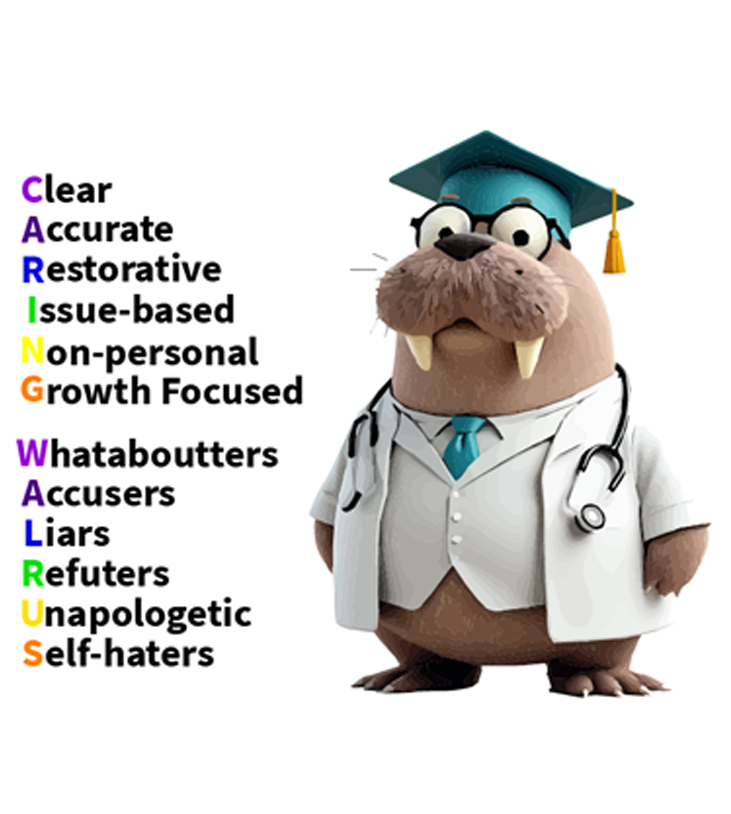The CARING WALRUS Model of Difficult Conversations
The CARING WALRUS Model is a supportive framework designed to equip leaders and individuals with the tools to navigate difficult or complex conversations effectively. Illustrated by a friendly walrus in a graduation cap and doctor’s coat, the model uses an acronym to outline key principles: Clear, Accurate, Restorative, Issue-based, Non-personal, Growth Focused, Whataboutters, Accusers, Liars, Refuters, Unapologetic, Self-haters. This model addresses a common challenge for new and existing leaders—overcoming fears about how others might react—and provides a structured approach to engage in meaningful dialogue.
Understanding the Model:
Core Principles:
Clear: Ensure communication is straightforward and unambiguous.
Accurate: Base the conversation on facts and truth, avoiding distortion.
Restorative: Aim to repair relationships or situations, not just address issues.
Issue-based: Focus on the problem at hand, not unrelated grievances.
Non-personal: Keep the dialogue professional, avoiding personal attacks.
Growth Focused: Seek opportunities for learning and improvement.
Challenges to Address:
Whataboutters: Prepare to deflect with “what about…” tactics.
Accusers: Have counters for individuals who blame or point fingers.
Liars: Address dishonesty with evidence and calm persistence.
Refuters: Counter those who deny or reject facts outright. Bring the evidence!
Unapologetic: Engage with those unwilling to take responsibility, or performance manage.
Self-haters: Support individuals who undermine themselves with self-criticism.
Purpose: The model helps leaders prepare by anticipating reactions and maintaining focus, preventing issues from being obscured, gas-lit, denied, or confused. It transforms fear into confidence by offering a roadmap to handle even the toughest dialogues.
This framework is crucial because difficult conversations often stall due to emotional reactions or avoidance. The CARING WALRUS empowers leaders to resource themselves and their partners, fostering resolution and growth.
The CARING WALRUS Model provides actionable steps to master challenging discussions:
Preparation: Before a conversation, outline the issue clearly and gather accurate data. Practice framing it restoratively (e.g., “Let’s find a way forward together”).
Stay Focused: Keep the discussion issue-based and non-personal. If it veers off, gently redirect with, “Let’s focus on this point.”
Anticipate Reactions: Prepare for “Whataboututters” by acknowledging their point briefly (“I see that concern, but let’s address this first”) or for “Accusers” by staying calm and fact-based.
Handle Challenges: For “Liars” or “Refuters,” present evidence politely (e.g., “Here’s what I observed—can we discuss?”). For “Unapologetic” individuals, focus on future action rather than past fault.
Support Growth: End with a growth-focused question like, “How can we improve from here?” to engage “Self-haters” positively.
Role-Play: Practice with a mentor or peer, simulating difficult responses to build confidence.
Post-Conversation: Reflect on what worked and adjust for next time, reinforcing the restorative aim.
By using the CARING WALRUS Model, leaders can approach difficult conversations with clarity and compassion, turning potential conflicts into opportunities for understanding and progress.
